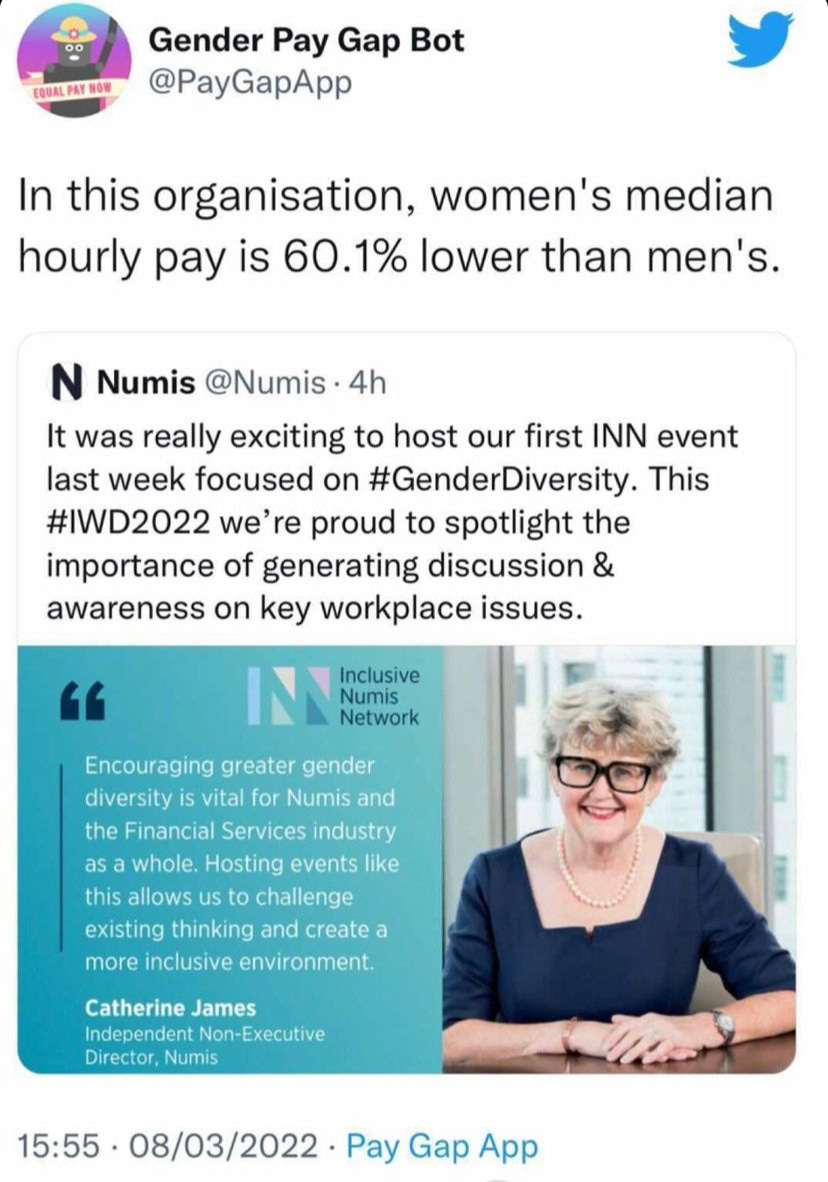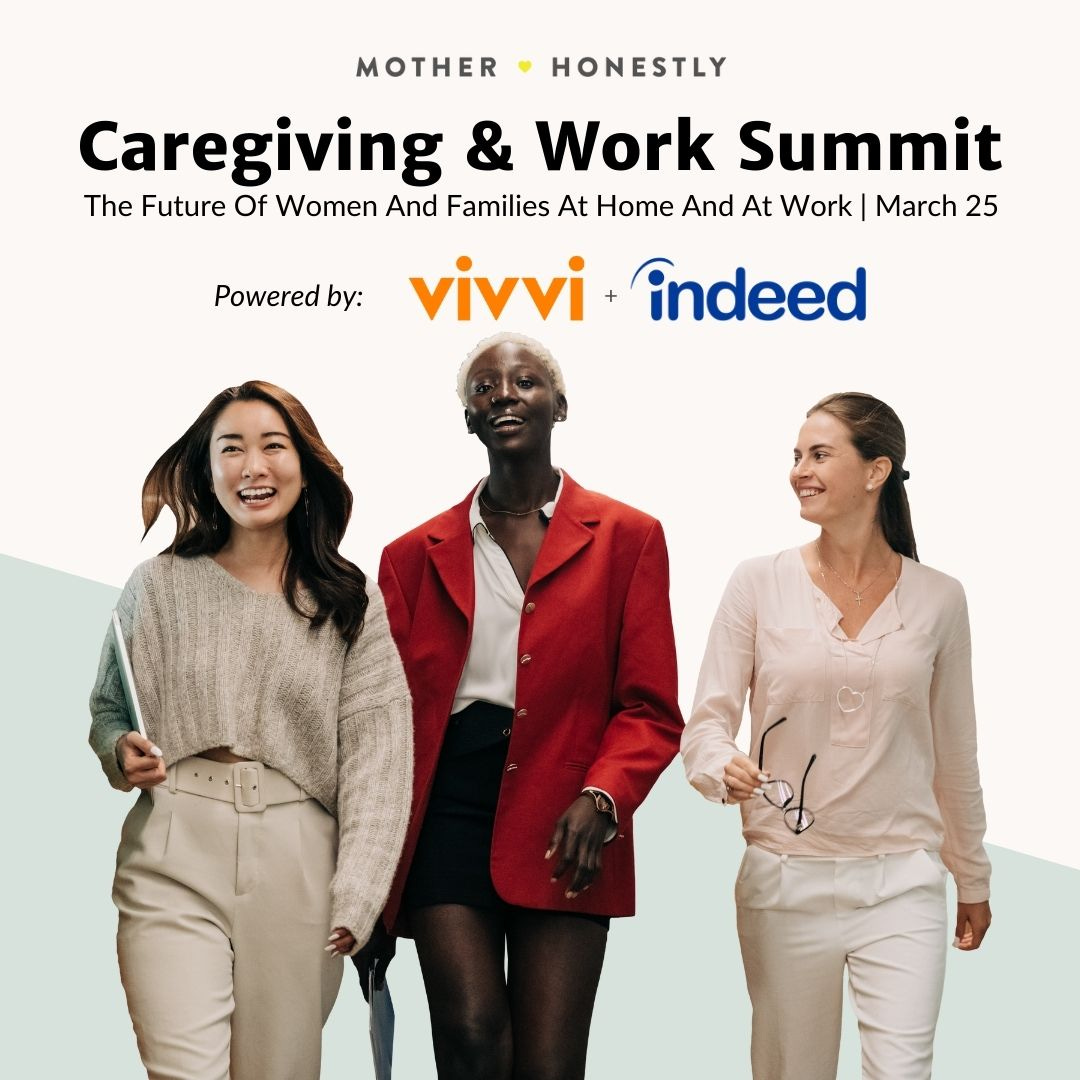Working Moms Can Change the World in 20 Minutes
We're efficient. We're persistent. We're great storytellers. Congress and employers better take us seriously.
Welcome! Please join our community of 10,000+ moms as we discuss the future of motherhood and work, and how women and families can lead better lives at home and in the workplace. If you are new here:
I’ll be honest: It was hard to feel celebratory about International Women’s Day on Tuesday. Across the globe, the pandemic has pushed women out of the workforce and girls out of school. In America, where childcare costs are skyrocketing and parents aren’t guaranteed paid family leave, the impacts have been especially dire. Experts predict these unfortunate trends will widen the pay gap between women and men.
That’s why I loved the ingenious Gender Pay Gap Bot, a Twitter account dedicated to revealing the gender pay disparity at every U.K.-based company that tweeted about International Women’s Day. It was developed by copywriter Francesca Lawson and software developer Ali Fensome, from Manchester, England. They were able to obtain pay information because companies with more than 250 employees in the U.K. are required to publicly share data about the differences in pay between men and women at their organizations.
It’s a clever way to bring attention to the gender pay gap. (In America, women on average earn 82 cents for every dollar men make. And employers don’t always take steps to fix the gaps in their own ranks, despite the women-friendly language in their carefully crafted company statements.) But you don’t have to have launch a viral sensation like the Gender Pay Gap Bot to bring awareness to the problem, or any other issue that impacts women and working moms. You can help make a difference in as little as 20 minutes, says non-partisan activist Cynthia Changyit Levin, the author of the new book, From Changing Diapers to Changing the World: Why Moms Make Great Advocates and How to Get Started.
If, like me, you’re feeling dispirited about how the last two years have imperiled women’s progress, don’t give up. I chatted with Cynthia about why working moms are perfectly prepared for advocacy work, and why it can actually be an act of self-care, even when you’re overwhelmed.
You and I know that moms are incredibly efficient, organized and capable. But the rest of the world doesn’t often see us that way. How can moms make sure they’re taken seriously when they begin advocacy?
When you are approaching elected leaders, one key to changing their perception is to band together. Showing up as an organized, effective group really impresses them. I think they also appreciate that moms don’t come in with a lot of jargon, like lobbyists. We can be rather refreshing, because we tell stories of our real lives, which we are obviously experts in! Getting involved with a reputable, nonpartisan organization is also really helpful.
In the book you mention that it’s more effective to compose a letter signed by a group of moms and bring it in person, as opposed to calling yourself. Working moms are pretty pressed for time for obvious reasons. What are some of the ways they can be the most effective advocates? What’s the best use of our time?
One of my favorite high-impact actions I like to take when I’m in a time crunch is to send a letter to the editor. If you are with an organization that has sample language, all you have to do is change it up a little bit so it includes something personal about you. Usually, if I’m working from a template, I can do that in about 20 minutes. If it gets published, then the paper does the hard work of distributing it to thousands of people across my area. Be sure to mention your elected representatives. Their aides scan the newspaper every day, to see what people are saying, so it gets their attention.
I also recommend hosting a lunch-and-learn hour with a dozen coworkers or friends. Tell them about your cause, and pass around a piece of paper with the phone numbers for your members of Congress. If you can get just 10 phone calls happening at once, that sends a flag to the office that something is happening, and it will float your issue to the top.
Cynthia is currently a volunteer with RESULTS, the ONE campaign, Bread for the World, CARE, Moms Demand Action for Gun Sense in America, MomsRising, and the UN Foundation’s Shot@Life Campaign.
In your book, you talk about how advocacy can equal self-care. I love this idea. Can you tell me more about what you mean?
Working moms sometimes we get to a point where we think, “If anyone just asks me to do one more thing, I’m going to explode.” That’s a real barrier to doing advocacy work. What I’ve learned, and what I’ve heard over and over again from other moms, is that what actually causes more anxiety is the feeling that we don’t have any control over the things that hurt our family so much. Taking action can bring you peace. When I hang up from calling Congress, I feel like I’ve accomplished something—and no one can take that away from me. I also feel solidarity when I’m working with a group, because I know that together our voices are making a difference, and that I’m not just shouting into the wind.
What do you want moms to know about getting more involved?
Moms often think, “I’m really busy, I can’t change the world, I’m just a mom,” and that mentality gets reinforced by society. But being a mom isn’t a liability; it’s a strength. Our kids have unintentionally trained us to be great advocates. Moms explain things very well. Moms are persistent. Moms are efficient. And moms are experts in the most important skills, like sharing, being respectful, and remembering to say please and thank you. You don’t need to emulate a high-powered corporate lobbyist to be an advocate—just tap into that feeling of caring for your kids, and go to the people in power and say, “I care.”
JOIN US:
Join Blessing Adesiyan of Mother Honestly, Amy Nelson of The Riveter, Pooja Lakshmin of Gemma, Hitha Palepu of 5 Smart Reads, and Brigid Schulte of New America as we discuss the effects of the pandemic on women and families.
Attend our Caregiving and Work Summit on Mar 25, for FREE. Thanks to our partners, we are offering 100 Tickets as a scholarship. Tickets are first-come first-serve, register for free here. You’ll walk away with practical, actionable advice on how to manage childcare as a busy working parent, how prevent burnout and much more.
BECOME A MEMBER:
Become a Mother Honestly member today to connect with other powerful moms and get access to 100+ hours of our keynotes and conversations, quarterly toolkits, digital summits, exclusive offers and more!
LOVE TO SEE IT
Moms in Poland leave strollers for Ukrainian moms crossing the border. Photographer Francesco Malavolta snapped a shot that went viral this week: a line of strollers in an empty train station in Poland, awaiting Ukrainian families fleeing the war in their country.
HATE TO SEE IT
Maternity wards are shuttering. More and more hospitals across the U.S. are closing their maternity wards, particularly in rural areas and communities of Black and Hispanic Americans. This, during a time when maternal deaths are rising sharply.
Childcare workers in America are going hungry. The industry’s low pay is pushing childcare workers to the brink of poverty—and forcing them to leave the industry and leave millions of American families without child care.
#RELATABLE


This newsletter was written by Audrey Goodson Kingo, Editor in Chief at Mother Honestly. Please send feedback, ideas and suggestions (or just say hello!) to me at audrey@motherhonestly.com. And if you found this newsletter helpful, please share with a friend!








